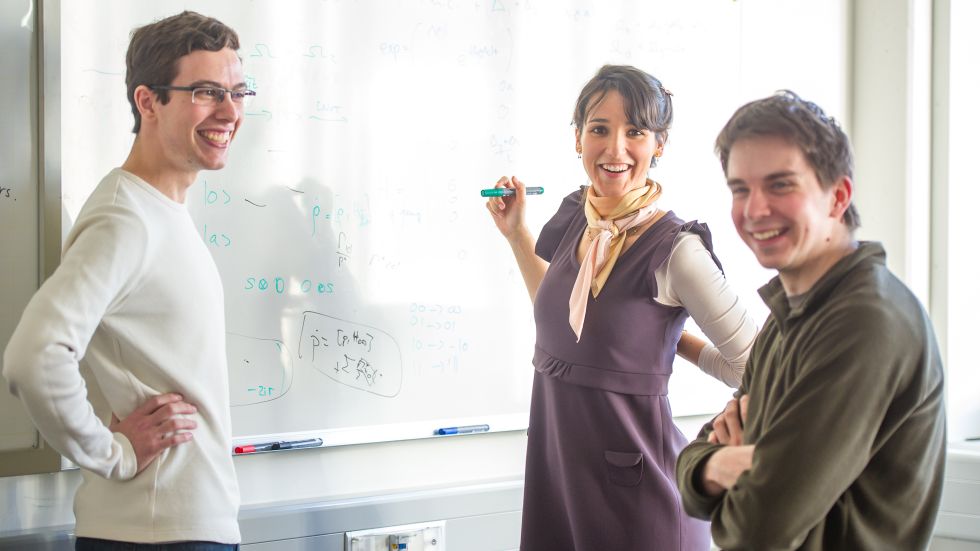Two ways to get your PhD
A doctorate is the highest academic degree that a university can award. In Germany, studying for a doctorate primarily means working intensely on a specific subject or research project for a long period of time. It typically takes five to six years to obtain a doctorate, though the length of time can vary.
How to obtain a PhD in Germany
If you decide to do a doctorate, you can choose between different forms of study. Depending on your discipline, research area, personal circumstances and formal qualifications, there are two different paths:
- Individual doctorate
The individual doctorate is based on independent research carried out alone under the supervision of one professor. This is the traditional path followed by over three quarters of all doctoral students in Germany. - Structured PhD programmes
These programmes offer a form of study similar to that found in English-speaking countries. You will be supervised by a team and will attend courses, lectures and seminars together with other doctoral students. Normally, such programmes are publicly advertised and often feature grants or paid doctoral positions.
Individual doctorate

The "traditional" or "individual" path to a PhD remains the most common in Germany. An individual doctorate involves a thesis or dissertation that is produced under the supervision of one professor.
This form of PhD study offers a great deal of flexibility, but also demands a high degree of personal initiative and responsibility. A professor supervises a PhD student, who works on his or her subject in consultation with the professor, but largely independently.
How long a traditional individual doctorate takes depends on your own time schedule – or on the duration of your work contract. On average, you can expect it to take five to six years. Although a university is normally responsible for the doctoral process, you can also carry out your research at other institutions.
Depending on your subject, research area and interests, you can choose whether to work on a research project and your PhD at a university or non-university research institute – or indeed in industry. However, no matter where you conduct your research, a professor will always supervise your PhD.
You can obtain a doctorate by pursuing research:
- at a university
- at a non-university research institute or
- in a German company
The "typical" PhD student in Germany works – usually part-time – as a research associate at his or her university. Although research is generally part of the job description, most of the associate’s own doctoral research usually has to be carried out outside working hours. How closely teaching, research and/or administrative duties are actually tied into the doctoral student’s own research depends very much on the individual situation.
Non-university research establishments – such as the Fraunhofer-Gesellschaft, Helmholtz Association, Leibniz Association and Max Planck Society – offer an excellent research environment in which to conduct your research. These institutions do not have the right to award doctorates themselves, but collaborate with universities for that purpose. They offer PhD students scholarships and/or (usually fixed-term) contracts of employment – or a combination of the two. However, support is also possible in the form of regular research posts, which are especially typical of Fraunhofer-Gesellschaft and the Max Planck Society.
Graduates who decide to work in industry and study for a doctorate part-time – often with funding and support from their employer – also need a university professor to supervise their research. In some cases, the employer will already be collaborating with a university or research institute and can help the PhD student find the right supervisor.
People who have PhD research posts within a company usually have part-time temporary contracts and work on a research project that allows them to pursue their doctoral research under the supervision of a professor. When a university and an industrial company collaborate in specially established institutes, doctoral researchers usually work on their projects with their professor and a supervisor from the company.
More information:
Find your individual doctorate
The traditional individual path to a doctorate remains the most common in Germany. In this case, the doctoral student works for the most part independently on their thesis, though in consultation with their supervising professor.
ExploreStructured PhD programmes

Structured doctoral programmes often have a strong international orientation with English as the team language. Unlike the individual doctorate model that can be freely structured to suit the individual research project, here doctoral students and their research proposals have to fit in with an existing PhD programme.
The doctorate frequently entails a clearly structured doctoral study programme with compulsory attendance at lectures or seminars and interim assessment (credit points). The programme frequently also covers academic and scientific methods or soft skills, such as presentation techniques.
As a rule, PhD Students work steadily at realising their research project within the team and with intensive support from a group of academic staff (often referred to as the “thesis committee”).
The duration of your studies is generally limited to three to five years, and there is usually a fixed curriculum within which you work toward your doctorate and write your thesis.
More information:
Find your structured PhD programme
Though no database containing all structured PhD programmes in Germany is available yet, we can point you in the direction of databases that will help you find what you are looking for nonetheless, where to obtain information about eligibility requirements and how to apply.
Explore
Check out our brochure:
Doing a PhD in Germany (2019, 40 pages)
This booklet for (prospective) international doctoral students presents the different options for doing a doctorate in Germany. It explains the formal requirements and gives some practical advice on finding the right supervisor or doctoral programme. It also outlines different sponsorship and funding options.